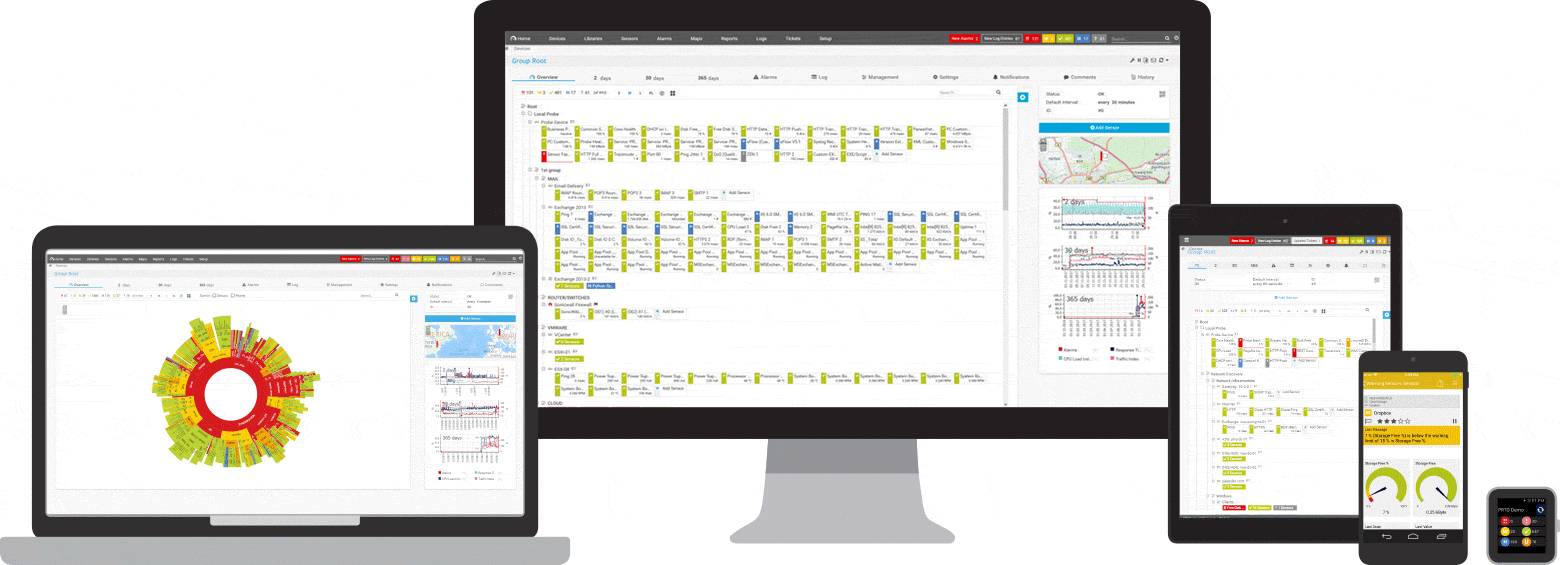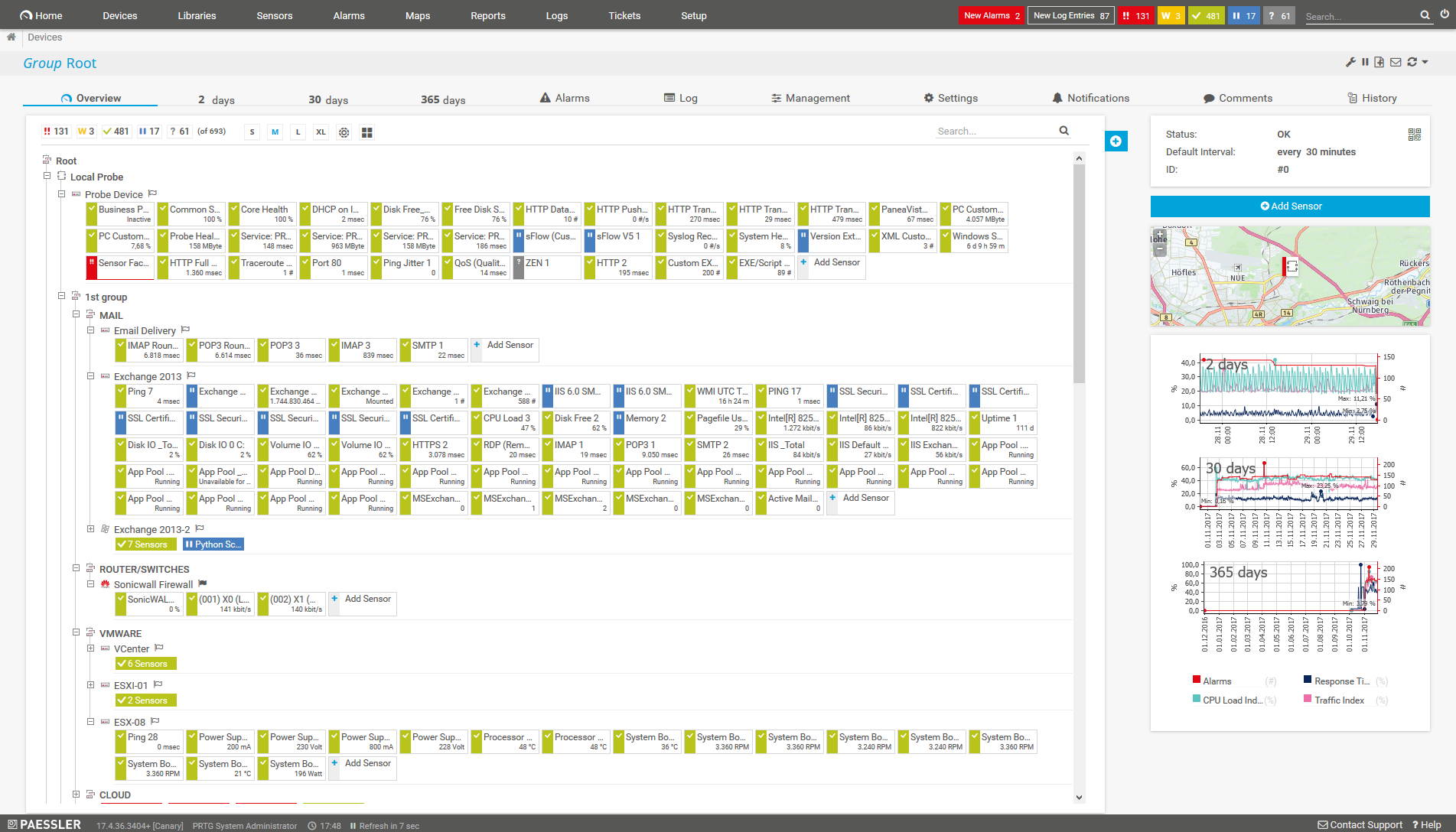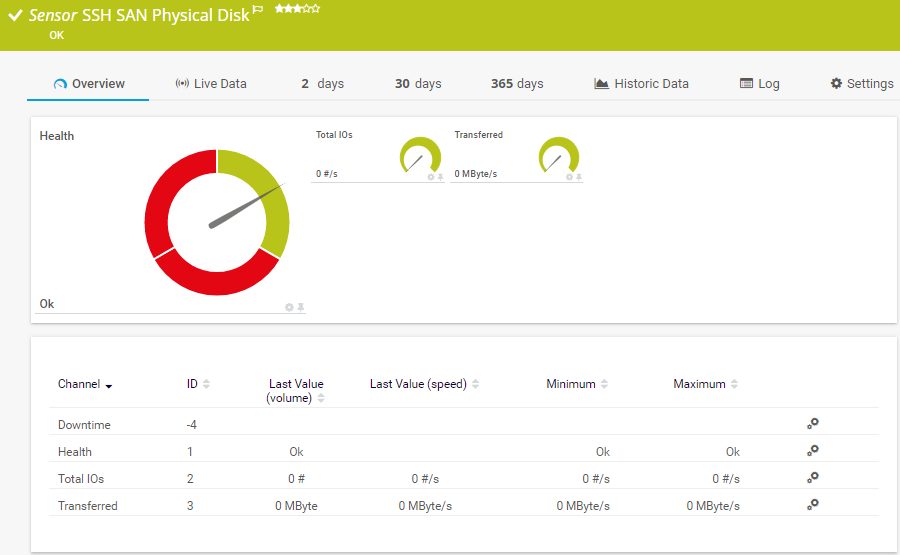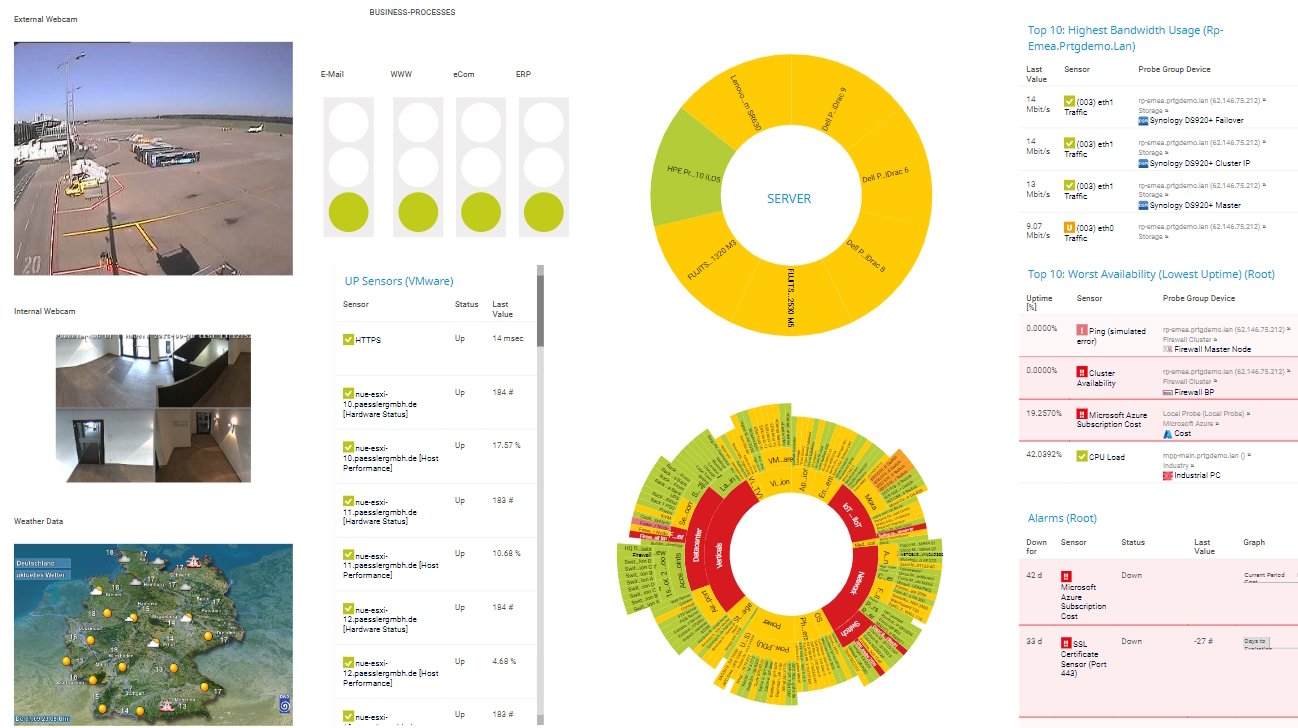Linux hardware monitoring with PRTG
Seamlessly integrate Linux hardware monitoring into mixed environments, including Windows and Unix systems
- Integrate seamlessly with a wide range of Linux distributions
- Reduce costly downtime with proactive hardware monitoring
- Monitor your entire network with a single, unified solution
PRTG Linux hardware monitoring: What you’ll find on this page
PRTG makes Linux hardware monitoring as easy as it gets
Custom alerts and data visualization let you quickly identify and prevent hardware issues in your Linux sytems.
Get comprehensive Linux hardware monitoring, even on a Windows network, with PRTG
Stop babysitting your servers
Sysadmins have enough on their plate – like troubleshooting surprise CPU spikes that leave you sweating, or dependencies turning your system into a tangled mess.
Paessler PRTG solves the issue of cross-platform monitoring by offering real-time insights into Linux, Unix, and Windows systems, without worrying about compatibility. Whether you’re monitoring CPU usage, memory usage, or looking for bottlenecks, PRTG’s real-time performance monitoring covers it all from one central platform.
Ditch the server room sauna
Part of system administration is keeping your server room cooled down. When your hardware is trying to have a meltdown, you need to quickly dial back the heat.
PRTG’s system monitoring tool includes SSH SAN System Health sensors that keep track of your server temperatures. With real-time temperature alerts, you’ll know when to act before your server room turns into a hardware barbecue.
Clock out on time
If you’ve been in system administration for any length of time, you know that Linux servers seem to have a knack for breaking down right before the weekend.
With PRTG’s predictive maintenance tools, you can catch potential issues like overheating, overloading, or system resource shortages, before they turn into full-blown disasters. By setting up command-line queries or using APIs, you can automate the entire process (and go home at 5PM on Fridays).
Never run out of disk space
If your disks are filling up faster than you can say “Oh, no!” and you’re constantly scrambling for space, it’s probably time to upgrade your Linux monitoring tool. PRTG comes to the rescue with SNMP Disk Free v2 and SNMP Linux Disk Free sensors.
These tools ensure your filesystem stays healthy by monitoring disk capacity and sending alerts long before you hit critical levels. No more getting blindsided by those pesky “disk full” errors.
Play cross-platform harmony
Juggling Microsoft Windows, Linux, and Unix systems, and monitoring them all can feel like herding cats, each with its own quirks and dependencies. But PRTG doesn’t care what you’re running.
Whether it’s Ubuntu, Debian, Distro, Red Hat, or some other flavor of Linux, PRTG's preconfigured sensors provide performance monitoring of all major systems from one platform. Now your network runs like a well-tuned orchestra, instead of chaos.
What Linux hardware monitoring looks like in PRTG
Diagnose network issues by continuously tracking CPU usage, memory capacity, disk health, and hardware temperatures. Show resource utilization and other key metrics in real time. Visualize monitoring data in clear graphs and dashboards to identify problems more easily. Gain the overview you need to troubleshoot Linux hardware effectively.
Start monitoring Linux hardware with PRTG and see how it can make your network more reliable and your job easier.
5 reasons to choose PRTG for Linux hardware monitoring
PRTG is highly customizable
PRTG is a full network monitoring solution and can be customized to meet your own individual needs. It comes with more than 250 preconfigured sensors, configurable alert options (email, SMS, push notification, HTTP request, etc.), and customizable dashboards. If it’s something that can be tweaked, we’ve made it tweakable.
PRTG runs 24/7 so you don’t have to
PRTG runs reliably in the background, 24 hours a day. With our software, you can set your own monitoring thresholds. PRTG only notifies you if these thresholds are reached and action is required. This keeps your network healthy and lets you focus on more pressing matters (like lunch).
PRTG is an auto-discovery wizard
When your network has grown into an unmanageable monster of devices, you can start feeling like Dr. Frankenstein, gluing all the parts together. Use PRTG's auto-discovery to instantly map out all your devices – including Linux servers – and organize them into a coherent monitoring setup. Tame the beast without breaking a sweat.
PRTG monitors key metrics with ease
PRTG delivers visualized metrics like memory usage, resource utilization, CPU performance, and network latency in clear, customizable graphs. Whether you’re using tools like htop or relying on the command line, PRTG integrates all the data into intuitive dashboards, so you can track trends and optimize performance without needing a PhD in system monitoring.
PRTG saves you money while you monitor
Monitoring tools can be expensive, making a healthy budget look like a lean shadow. PRTG is for every kind of business, from small and medium-sized companies to groups with huge IT infrastructures. With PRTG’s flexible subscription licensing, you only pay for the sensors you need. Whether you’re monitoring a few systems or a whole fleet, you get enterprise-level monitoring without emptying your wallet.
Your Linux hardware monitor at a glance – even on the go
Set up PRTG in minutes and use it on almost any mobile device.


Find the root cause of the problem with our PRTG Linux hardware monitoring solution
Real-time notifications mean faster troubleshooting so that you can act before more serious issues occur.
PRTG is compatible with all major vendors, products, and systems
Explore our preconfigured PRTG sensors for Linux hardware monitoring
PRTG comes with more than 250 native sensor types for monitoring your entire on-premises, cloud, and hybrid cloud environment out of the box. Check out some examples below!
Create innovative solutions with Paessler’s partners
Partnering with innovative vendors, Paessler unleashes synergies to create
new and additional benefits for joined customers.
INSYS icom
With the combination of PRTG and Insys, the monitoring specialist Paessler and the industrial gateway manufacturer INSYS icom offer a practical possibility to merge IT and OT.
“Excellent tool for detailed monitoring. Alarms and notifications work greatly. Equipment addition is straight forward and server initial setup is very easy. ...feel safe to purchase it if you intend to monitor a large networking landscape.”
Infrastructure and Operations Engineer in the Communications Industry, firm size 10B - 30B USD
PRTG makes Linux hardware monitoring as easy as it gets
Custom alerts and data visualization let you quickly identify and prevent hardware issues in your Linux sytems.

PRTG: The multi-tool for sysadmins
Adapt PRTG individually and dynamically to your needs and rely on a strong API:- HTTP API: Access monitoring data and manipulate monitoring objects via HTTP requests
- Custom sensors: Create your own PRTG sensors for customized monitoring
- Custom notifications: Create your own notifications and send action triggers to external systems
- REST Custom sensor: Monitor almost everything that provides data in XML or JSON format
We asked: would you recommend PRTG?
Over 95% of our customers say yes!
Paessler conducted trials in over 600 IT departments worldwide to tune its network monitoring software closer to the needs of sysadmins.
The result of the survey: over 95% of the participants would recommend PRTG – or already have.
Still not convinced?
More than 500,000
sysadmins love PRTG
Paessler PRTG is used by companies of all sizes. Sysadmins love PRTG because it makes their job a whole lot easier.
Monitor your entire IT infrastructure
Bandwidth, servers, virtual environments, websites, VoIP services – PRTG keeps an eye on your entire network.
Try Paessler PRTG
for free
Everyone has different monitoring needs. That’s why we let you try PRTG for free.
Start monitoring Linux hardware with PRTG and see how it can make your network more reliable and your job easier.
|
PRTG |
Network Monitoring Software - Version 25.1.104.1961 (April 7th, 2025) |
|
Hosting |
Download for Windows and cloud-based version PRTG Hosted Monitor available |
Languages |
English, German, Spanish, French, Portuguese, Dutch, Russian, Japanese, and Simplified Chinese |
Pricing |
Up to 100 sensors for free (Price List) |
Unified Monitoring |
Network devices, bandwidth, servers, applications, virtual environments, remote systems, IoT, and more |
Supported Vendors & Applications |
|













